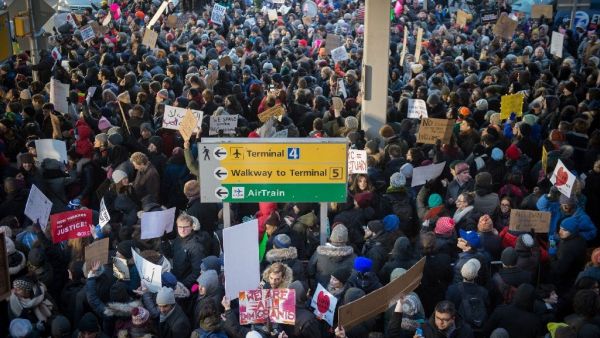The US Department of Homeland Security (DHS) on Sunday said it would continue to enforce a ban on people arriving from certain Muslim-majority countries, despite a federal judge's order placing a hold on the controversial measures.
"President [Donald] Trump's Executive Orders remain in place — prohibited travel will remain prohibited, and the US government retains its right to revoke visas at any time if required for national security or public safety," DHS said in a statement.
The statement, along with a tweet from Trump early Sunday in which he said the country needs "extreme vetting, NOW," indicated that his administration had no intention of backing down despite legal rulings overnight.
Trump said on Twitter the US needs strong borders in addition to extreme vetting.
"Look what is happening all over Europe and, indeed, the world — a horrible mess!" he said.
Trump's order, which he signed on Friday, temporarily suspended refugee admissions and banned citizens from seven Muslim-majority countries from entering the United States.
It was immediately challenged in court by the American Civil Liberties Union (ACLU) in New York City, and US District Court Judge Ann Donnelly issued an order late Saturday temporarily preventing refugees and immigrants from being deported.
Donnelly said that the order risked causing "irreparable injury" to refugees and people who have been granted US visas.
There was confusion at US airports where refugees and people with valid visas were being detained and at airports outside the US where travellers were being prevented from boarding flights to the country.
The DHS statement added to the confusion by saying the department would "comply with judicial orders" at the same time it pledged to carry out Trump's order, which it described as "a first step towards re-establishing control over America's borders and national security."
It said the restrictions affected less than 1 per cent of the more than 325,000 international air travellers who arrive every day.
Protests against Trump's executive order occurred at airports across the United States over the weekend.
Trump promised during his campaign for president last year to temporarily ban Muslims from entering the US and review the processes used for allowing refugees in.
His actions have drawn international criticism, with German Chancellor Angela Merkel voicing her opposition to the ban in a statement on Sunday.
The order suspends the US refugee admissions programme for four months, blocks Syrian refugees indefinitely and bars entry to all travellers from Syria, Yemen, Iran, Iraq, Somalia, Libya, and Sudan for 90 days.
Iran has threatened to retaliate by barring US citizens from entering the country.
British Prime Minister Theresa May, who met Trump just before he signed the order, asked her foreign and home ministers to speak to their US counterparts about the ban.
Foreign Secretary Boris Johnson said it was "divisive and wrong to stigmatize because of nationality."
Trump has insisted that the order is "not a Muslim ban" and said he was taking the action because the US "must ensure that those admitted to this country do not bear hostile attitudes toward it and its founding principles."








